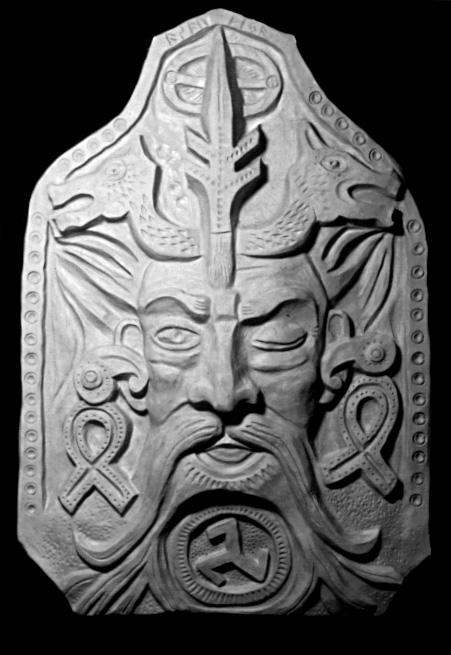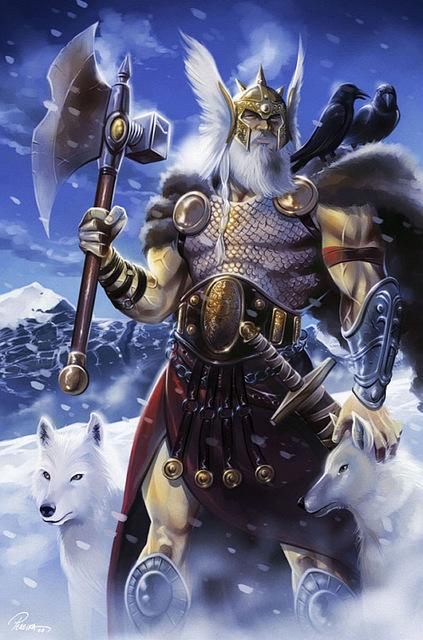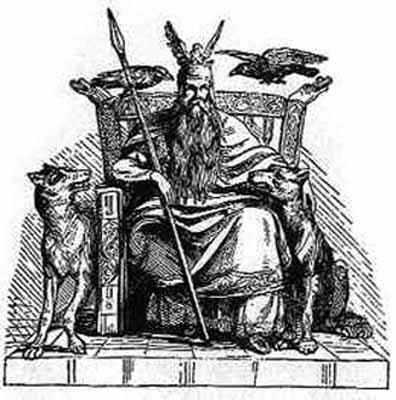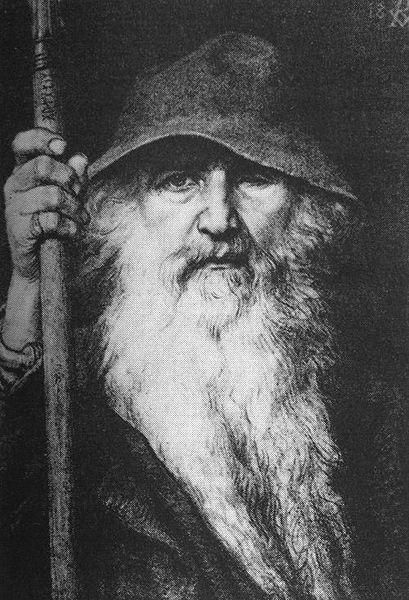All-Father Odin is the grand king of the Gods of Asgard, one of the most powerful beings in the cosmos, and certainly the mightiest of beings in all the Nine Words comprising the Asgardian cosmology (with the possible exceptions of his arch-enemies, Surtur, lord of the fire demons of Muspelheim and Ymir, lord of the ancient race of Frost Giants who once inhabited Niflheim). One of the oldest of the Aesir tribe of Asgard, Odin gained his extraordinary levels of power and wisdom through great sacrifice and struggle, and he expects nothing less of those mortals who wish to gain his favor and assistance. Nothing worth having can ever come easy, or it's effectively worthless in the scheme of things because no lessons were learned along with its acquisition. Only through trial and perseverance can one gain all worthwhile goals and desires, and Odin will be quick to remind all who follow and revere him of this, should they ask him for aid. He is believed to have once held a lesser station in the religious systems of the predecessors to the Vikings and Teutons - the latter ancestors of the Germans referring to him as Wotan - but he later moved up to the top position in the divine hierarchy by the time the Vikings and Teutons established worship of the more familiar version of this supreme deity, possibly displacing Tyr from that position (the latter of whom was "demoted" to the god of war in the faith systems of the Vikings and other Anglo-Saxon societies of the past - the latter of whom referred to the war god as Tiu).
Odin was the son of Bor and Bestla, two very ancient deities who were among first of the Aesir tribe that went on to combine with another divine tribe (the Vanir) to form the Asgardians. He originally shared rulership of Asgard with his older brothers, Vili and Ve, but at the climax of a tremendous war with the primordial fire demon Surtur and his forces after they invaded Asgard from the fiery realm of Muspelheim, Vili and Ve had apparently sacrificed their existences to drive and seal Surtur out of Asgard, conferring their combined power to that already possessed by Odin, thus enabling him to become sole ruler of the celestial realm.
According to legend, Odin acquired much of his great power through no less a tribulation than hanging from one of the branches of the cosmic world tree Yggdrasil via a rope around one of his legs for nine days and nights without food or water, and it was through this trial that amongst what he earned was the secret of the runes. He sacrificed one of his eyes to the Well of Mimir in order to acquire the Wisdom of the Ages, which was not only a vast surfeit of wisdom but also a great amount of knowledge of the universe and how its physical laws are structured.
Often appearing to his reverents as an older but quite robust man of impressive height, Odin is said to oftentimes take on the role of the Wanderer, and in this guise he is said to walk the common lands of Midgard (Earth) while appearing as an elderly man with a long gray beard who is attired in simple clothing and a wide-brimmed hat (which Odin often uses to cover his missing eye). While sitting on his fabled throne in Asgard, he can see everything going on within any of the Nine Worlds simultaneous to their occurrence, as well as the wider aspects of the cosmos. He wields the mighty spear Gungnir, which he uses as a focusing medium for his power, and it serves as a weapon that can penetrate almost anything he hurls it against, as well as benefiting from an enchantment that enables it to return to his hand immediately after it strikes its intended target. Always at his side are his two honored comrades, the great gray wolves Gerri and Frecki, and also at his beck and call 24/7 are the two legendary ravens Huginn and Muninn (Thought and Memory, respectively) who fly about the Nine Worlds gathering information that they then whisper in Odin's ear upon their return from their routine forays of data-gathering. He rides the amazing eight-legged snowy gray steed Sleipnir, who was birthed by Loki while shape-shifted into the form of a mare and impregnated by a giant's incredibly powerful stallion; Sleipnir is capable of running through the skies of any of the Nine Worlds at velocities that would be considered astounding to mortal perception, and this mystical horse can breach dimensional barriers separating different planes of reality with ease, thus making him the perfect mount for a deity of Odin's stature.
Odin is married to the great and influential goddess Frigga, and he is also the father of the fabled thunder god and protector of Midgard, Thor (whose mother was the Earth Goddess Jord), and "blood brother" of the crafty Trickster deity Loki. He also sired the half-giant warrior god Vidar, who would be elusive during the reign of the deities but played a major role in revenging his father's demise at the jaws of the Fenris Wolf during Ragnarok - the prophesied fall of the current order of deities - and is said to be the father of Balder, the much beloved god of light, with his wife and queen, Frigga. Odin has often been most revered by the ruling classes of past eras who fell under his province due to his place of regency in the Asgardian pantheon, and as such scholars through the ages have wrongly imbued him with aspects of their treachery and willingness to retain power over the natural order at all costs. There can be no doubt, however, that Odin considers himself above common mortal conceptions of good and evil, and he is much feared by his worshippers and reverents for his unpredictable ways of giving requested aid, and in managing his two greatest goals: the preservation of the human race who he looks upon as something akin to his children and he their caregiver, and his determination to find a way of averting Ragnarok, the prophesied 'Twilight of the Gods' in which the Nine Worlds will collapse in the final battle between the deities and the combined might of all their enemies (which can be viewed as the Nordic equivalent of the Christian event of Armageddon).
Odin is a potent variation of the archetypal Wise Old Man based on Jungian philosophy, and he can be viewed as a Great Spiritual Father Figure to humankind, particularly those who follow the Norse path in either reconstructions of its ancient practices or more modern ways of revering the deities. As such, he can be a very stern father figure at times, and he can be a proponent of a macrocosmic version of the mortal conception of "tough love" to his followers. He is also, according to legend, the Great Physician, and was revered for having bequeathed the gift of medical science to the human race, and in this capacity he has tremendous power to heal the ills of mortals, but will do so only if he believes doing such a thing would ultimately benefit the Greater Good in accordance with his plans for humanity. He is fully capable of seeing aspects of the cosmos that are closed and even outright incomprehensible to the typical mortal, and because of this his decisions can sometimes be inexplicable or even capricious by mortal standards. He also has the power to meddle in the fate of individual mortals or even particular groups of mortals, though while doing so even he must first contend with the will of the Norns, the personifications who weave the tapestry of fate or kismet for all beings in the cosmos, and the consciousness overriding the dictates of this mighty Force in the universe can be loathe to allow even one such as Odin to tamper with these cosmic plans.
Odin has notably taken on the fearsome aspect of the Lord of the Wild Hunt, where he periodically rides Sleipnir through the night skies of Midgard amidst a procession of wild slavering hounds, sometimes accompanied by the Germanic death goddess Holda (a likely aspect of Loki's daughter Hela, the terrifying goddess who rules the Norse underworld). Sometimes seen parading through the night skies to this very day by unwary mortal travelers, Odin's ultimate purpose for taking these dramatic rides in his aspect of Lord of the Wild Hunt are unknown, but they are much feared by all who may inadvertently come into contact with them.
Odin rules over half of Valhalla, a special section of Asgard that acts as the Viking equivalent of Heaven or the Wiccan Summerland, where the souls of the virtuous and those who died heroically in defense of their beliefs or homeland - including many brave warriors - dwell in eternal bliss in an idyllic belief system territory of the Other Side, with the other half ruled over by the great Asgardian goddess Freya (who is said to get first pick over the fallen mortals). Odin (like Freya) is attended in this task by 13 warrior goddesses known in legend as the Valkyries, led "on the field" by Brunhilda, who carry spears with their tips aglow with flame, are mounted on great flying stallions with bird-like wings (much like the fabled Pegasus from Greco-Roman legend) whose manes rain dew upon the land below them, and are known collectively as the "Choosers of the Slain," for these goddesses decide which fallen individuals are worthy of entrance into Valhalla, and upon choosing them, they act as escorts to the souls of these fallen heroes from the material realm to the one awaiting their consciousness following their physical demise. The other two afterlife realms known to the Norse - Helheim (or simply Hel) and Niflheim (the realms of the common and dishonored dead, respectively) - both fall under the jurisdiction of the dark goddess of the underworld, Hela.





